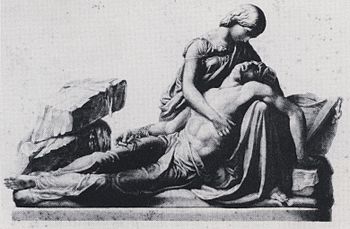 |
| Mary Wollstonecraft Shelley and Percy Bysshe Shelley. Stipple engraving. (Photo credit: Wikipedia) |
If you don't know already, my guess is that if I told you the above description was taken from another novel based on Mary Shelley's "Frankenstein" you would not challenge me. Besides his wild eyes, Mary Shelley offers us no physical descriptions of Victor Frankenstein in her novel. However, the above text comes from Shelley's biographer, Thomas Jefferson Hogg when he describes the famous poet during his time at Oxford University. It's an interesting image. Like Victor Frankenstein, Shelley combined an avid interest in the metaphysical and the occult with the ways of modern science. His spirit and manic enthusiasm paint the very picture many actors would take on board when they portrayed this character.





![Cover of "The Brave One [Blu-ray]"](http://ecx.images-amazon.com/images/I/51etUM-gZxL._SL350_.jpg)